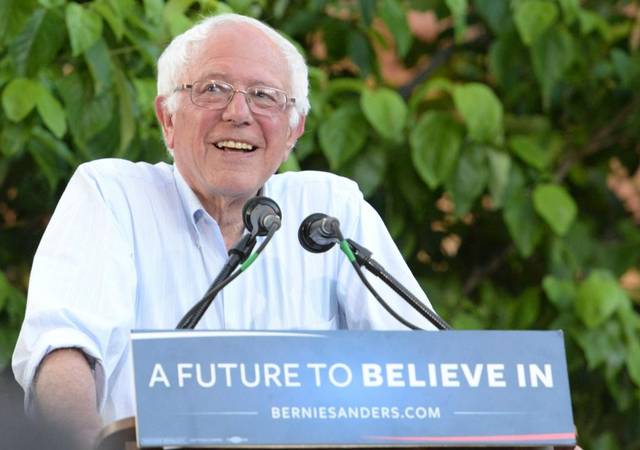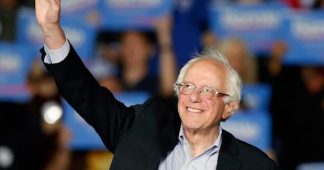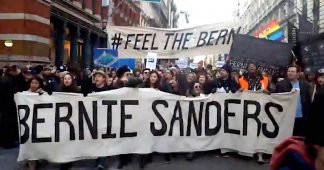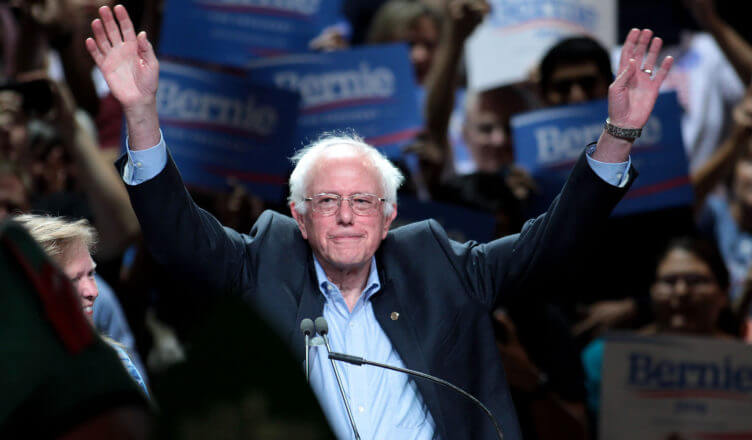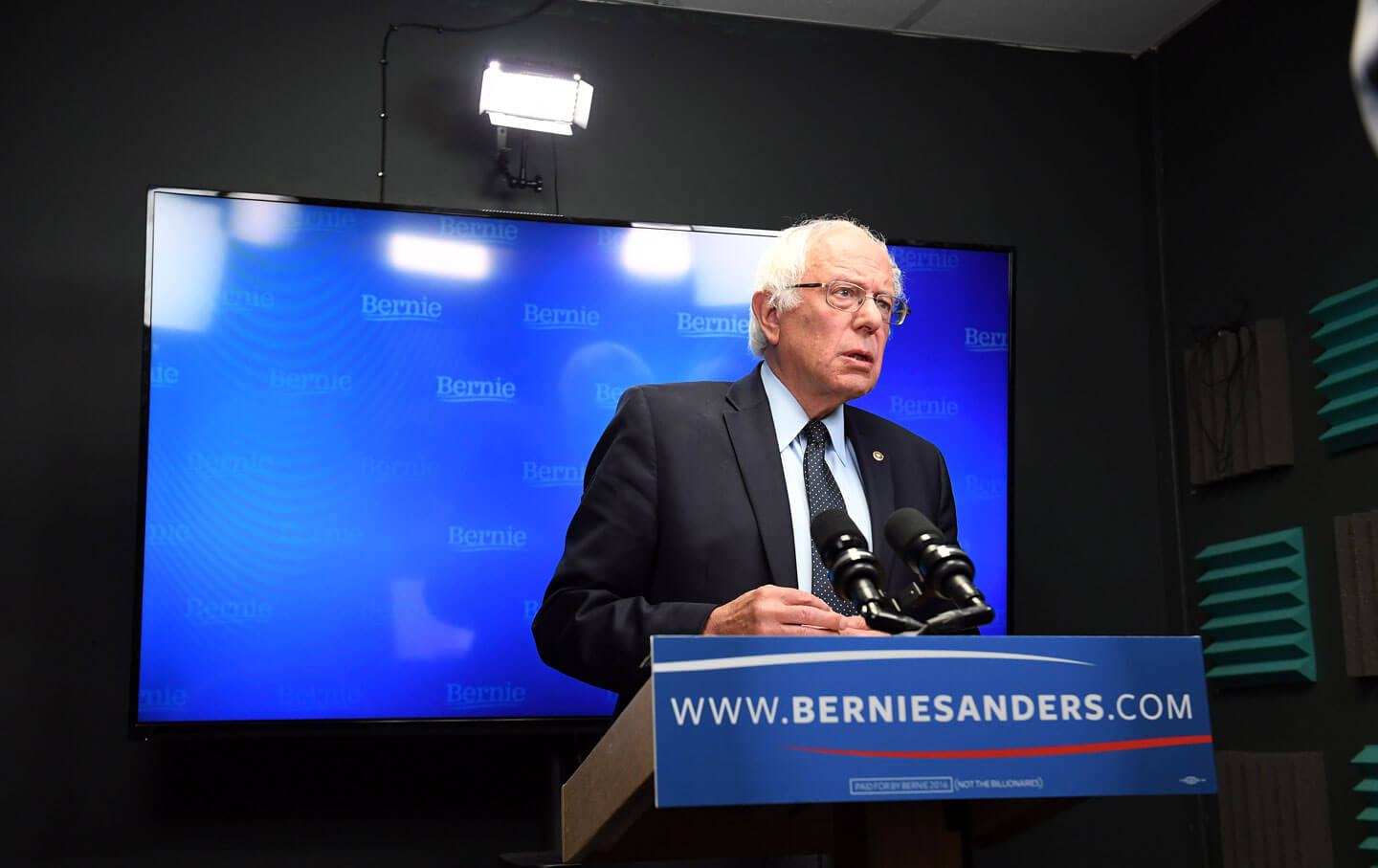What an amazing Democratic primary season it’s been, including this happy result: WE WON!
“We” being the millions of young people, mad-as-hell working stiffs, independents, deep-rooted progressives, and other “outsiders” who felt the Bern and forged a new, game-changing, populist force of, by, and for grassroots Americans. True, this progressive-populist coalition did not win the White House on its first go ’round behind the feisty Sanders insurgency (which the smug political establishment had literally laughed at when he began his run). But they are not laughing now, for even they can see that the outsider revolt against power elites won something even more momentous than the 2016 election: The future.
Back in April 2015, when the blunt, democratic socialist from Vermont issued a call for disenchanted voters to join him, not merely in a campaign for the presidency, but in a long-term movement to “revitalize American democracy so that government works for all of us,” even his most optimistic backers couldn’t have dreamed the movement would come so far so quickly. Let’s reflect on some fundamental changes this progressive uprising has achieved in the past 15 months:
It yanked the national debate out of the hands of the Washington and corporate elites –both devoted for more than 30 years to rigging all the rules to further enrich the 1-percenters at the expense of everyone else–and proved that future success requires Democrats to abandon their effete namby-pambyism and embrace the vision, message, and issues of unabashed populism.
It revived true bottom-up campaigning through innovative social media outreach, the empowerment of hundreds of thousands of engaged supporters and volunteers, instantaneous mass communication via cell phones, and turning people out by turning them on–by finally addressing inequality head-on and proposing bold policies that appeal directly to the workaday majority’s interests.
 Cartoon by Brian Duffy
Cartoon by Brian Duffy
It lifted–from the political scrap heap up to the top of our national discourse-the concerns of middle and low-income families: creating good, middle-class jobs through a national program of infrastructure repair and development of the green economy; enacting a $15 minimum wage; removing crushing education debt from the backs of students; coping with the imminent crisis of climate change; repealing the Supreme Court’s democracy-destroying Citizens United edict; implementing pay equity for women; stopping the war machine’s constant adventurism; expanding Social Security; providing Medicare for all; halting the unjust mass incarceration of African-Americans and Latinos; defunding the disastrous drug war; demilitarizing our police forces; replenishing our public treasury by taxing Wall Street speculators; and generally restoring economic fairness, social justice, and equal opportunity for all as central purposes of public policy.
It raised some $229 million in more than 8 million small donations (averaging only $27)–including millions from low-income people who sent in $5 or even $1–thus debunking the myth that Democrats can only be competitive by joining Republicans in taking corrupting big money from corporations and setting up “dark money” SuperPACs
It created a hopeful, formidable, and growing populist political channel that is both insistently democratic and independent of the Democratic Party. This state-based, national network of Berniecrats will keep building its connections; pushing its agenda; and backing populist candidates in House, Senate, and other races this fall. Then, on to next year’s campaigns for mayor, city council, etc., which will be charged by the 20,000 Sanders supporters who have, according to Bernie, signed up online to get info on running. Then, to the 2018 midterm congressional elections. And then, to the 2020 presidential campaign.
Campaigns end on Election Day. Revolutions don’t.
The fervent prayer of old-line Democratic operatives and corporate funders is that The Sanders Storm will dissipate now with Hillary Clinton’s nomination, thus allowing politics-as-usual to reestablish its grip on the system. Here’s why I think they’re dead wrong:
First, whatever else you think of Clinton, she’s certainly smart, savvy, and accomplished, and she didn’t come this far by ignoring important shifts in the political winds. As Sanders’ tub-thumping message drew huge crowds, new voters, and that deep pool of small donors, she adjusted her wings to try riding some of the powerful thermals rising from America’s grassroots. A career-long corporate Democrat, Clinton began sounding more and more like Sanders, sympathizing with the rising fury of working-class families and becoming at least Bernie-lite on several populist proposals.
You can view her adaptations as hopeful or hopelessly cynical, but the point is that Clinton recognizes that a new power is loose on the land. Understanding that the same-old Bill & Barack moderate corporatism won’t charge up the crowds she needs in November, she’s scrambling to tap the electric populism of the Bernie Rebellion. This rebellious spark is the true hope of a moribund Democratic Party that registers only 29 percent of eligible voters. Far from wishing away the energetic millions who “Feel the Bern,” entrenched Democratic elders should beg these hot-blooded activists to revitalize the party. In fact, a June poll by Reuters/Ipsos found that three quarters of Democrats (including Hillary backers) want Sanders to have a “major role” in shaping the party’s positions, and two-thirds wanted him as her VP choice.
Think about it: While Bernie was the oldest candidate running for president, in heart, soul, vigor, and vision he is by far the youngest. He won the majority of voters under 45 years old and a stunning 71 percent of under-30 voters. In the under-30 demographic, Bernie even won decisively among women, including African Americans and Latinas. He also dominated among independents who voted Democratic. There’s the future.
This surge reflects a level of organized, grassroots, progressive leverage missing for decades. Since the 1980s, the party of Franklin and Eleanor Roosevelt has been shedding its work clothes and donning the suits of the comfortably wealthy, while simultaneously accepting a Reagan-esque faith in the trickle-down magic of enriching those at the top (who also just happen to be the political donor class). This year the grassroots insurgents who picked up Sanders and rammed him through the front gate of the Democrats’ corporate bastion have shattered that complacency, exposed the party’s drift from democratic principles, and opened the system to the possibility of another populist moment in American history.
Don’t mourn. Organize!
The second (and most powerful) reason that I believe this rebellion will persevere is that it’s organic. Not an artificial marketing creation sprouted in some D.C. hothouse by national groups and moneyed interests, this is a wildflower movement that sprang up spontaneously, took root, and seeded thousands of zip codes.
Despite supporters’ natural disappointment that their efforts ended short of the Oval Office, the majority are not petulantly giving up on politics, as most pundits predicted. Why would they? After all, this corps of pro-democracy activists seemingly came from nowhere, won 22 states, virtually tied in five others, and revolutionized the Democrats’ message, policy agenda, and method of campaigning. Having proven their mettle as a talented and inventive grassroots network, they’re eager to push forward. I’ve been out there among them for months–from Great Falls to Cedar Falls, Albany to Albuquerque, Carson City to New York City, and more–and I’ve witnessed their creativity and grit. No way they’ll “Bern out” and fold, for they have audacious, long-term ambitions.
“Two wrongs don’t make a right, but three left turns do.” –Jim Hightower
Besides, the gross inequality and corporate rapaciousness they’re fighting will not just go away–and are likely to deepen and spread. Unlike the political and media establishment, which treats elections as periodic games to be “won” with pollsters, funders, and tricksters, this populist team is engaged in REAL politics: the ongoing struggle by everyday people to democratize America’s wealth and power to bene t all and serve the common good.
Revolutionaries
The Democratic campaigns to a Bernie v. Hillary war, most Sanders backers were enthusiastic precisely because his campaign’s purpose was far bigger than the usual personality politics. They were signing up for a revolution against corporate rule! “Bernie 2016” stands as a new Declaration of Independence by America’s workaday majority –and this is just the beginning. As with the rebellion of 1776, declaring independence doesn’t achieve it. We have to keep mobilizing for a truly democratic movement–even as we battle the bastards ruling over us. This is much harder than one presidential run, but it’s a Big Politics that is worthy of us. And toward that historically profound goal, “BernieNext” is coming. Sanders and close advisors are strategizing to help grow the grassroots rebellion. To be announced after the Democratic convention, this new coordinating network will build on the framework and momentum of the campaign. And there’s this, too: A multitude of Bernie supporters are not waiting on a smoke signal from headquarters. The genius of Sanders’ run is that it encouraged the flowering of myriad ideas from grassroots volunteers and local staffers. Digitally savvy young people in particular leapt at this opportunity to color outside the prescribed political lines. They used “disruptive innovation” to mobilize huge numbers of supporters, defy political odds-makers, confound old-line Democratic operatives–and score big victories. With the primaries over, that mushrooming, percolate-up creativity has already burst into new organizing projects that are advancing this energized populist movement. Here are two examples:
“The issue isn’t just jobs. Even slaves had jobs. The issue is wages.” –Jim Hightower
The People’s Summit. In the world of politics-as-usual, a losing candidate’s supporters just drift away, but All-Things-Sanders tend to be unusual. So, on June 17, just three days after the final Democratic primary, some 3,000 hardy Berniecrats from all across America gathered in a Chicago convention center to “Keep the Bern Alive.” Rather than being morose and cynical about Sanders not winning the nomination, attendees were exuberant about the future and the movement that he galvanized. I was there as both a participant and the final send-off speaker of this extraordinary, uplifting event–a combination of tent revival, workshops for serious strategizing and organizing, and a rightly labeled “Festival of Joyous Rebellion.” The two-day summit was convened by National Nurses United (a scrappy, aggressively progressive union) and co-sponsored by more than 50 diverse and effective democracy-building groups.
Even jaded veterans of a zillion dead-end conferences conceded hat this one actually has the potential to put real progress in “progressive.” It had a minimum of blah-blah and a maximum of planning on how to put experienced, locally based organizers and volunteers directly into growing the movement–starting now. These ever-larger and broader local coalitions will: (1) be rooted in principled, anti-corporate politics; (2) launch direct grassroots initiatives and actions on a range of populist issues; (3) recruit, train, and elect thousands of movement candidates to school boards, city councils, state legislatures, and other offices (more than 800 attendees pledged to run); and (4) deepen the relationships and sense of shared purpose in this revolutionary democratic movement. Oh, yeah–and (5) make it fun–putting the “party” back in politics.
Brand New Congress. What if progressive organizers and volunteers joined forces to run a nationwide campaign to replace today’s corporate-owned Congress–all at once? Yes, one sweeping campaign to oust all incumbents of either party who owe their jobs to (and do the bidding of ) the Big Money powers. Those congress critters, feeling snug in their gerrymandered rabbit holes, could be outed by hundreds of coordinated, Brand New Congress campaigns running simultaneously in every state. Each local campaign would back locally recruited grassroots candidates publicly pledged to fight for an agenda of economic, social, environmental, and political justice. An honest, accountable Congress that works for all!
Impossible? Not in the fertile minds of Zach Exley, Becky Bond, and other former Sanders staffers who conceived and implemented his campaign’s successful grassroots model that Exley calls “distributed organizing.” Essentially, they trained and empowered tens of thousands of far-flung volunteers to be autonomous organizers, digitally linked into a nationwide network. This strategy eliminated the need (and cost) of a rigid hierarchy of “leaders” to boss volunteers, recognizing instead that volunteers themselves are leaders (in churches, clubs, workplaces, community groups, etc.), and with basic training and a few inexpensive tools, can be trusted to orchestrate area campaigns. Now they’re applying this model to Brand New Congress campaigns that carry the message of authentic populism and a shared agenda of populist policy proposals.
BNC is to be a true bipartisan effort, running Dems in blue districts, Repubs in solid red ones, and independents wherever that makes sense. But wait–how can BNC get Republican candidates to run on progressive values? By recognizing that true populism is neither a left or right theory, but a top-versus-bottom reality that even middle-class and lower-income Republicans can relate to. (Note: In Vermont, which often elects Republican governors, Sanders won 71 percent of the vote in his last Senate run.) Indeed, outside of the right-wing Congress, many rank-and-file Rs would support stopping global trade scams and crony-capitalism corruption, as well as assuring health care for all, recognizing climate change, and standing up to bigotry.
BNC will provide tools, trainings, lists, and other assistance to make each local campaign competitive against the corporate-backed incumbent. The overarching intention is to keep the revolution real and growing by moving it deep into the grassroots, while also offering the Big Idea of an un-gridlocked, do-something Congress–a bold goal that can whip up the same sort of nationwide enthusiasm, volunteerism, and massive small-dollar fundraising that Sander’s presidential campaign sparked.
Moving forward
Bernie’s success emerged like a grito–a long-suppressed shout of rebellion–from the battered soul of working-class America. It sprang in part from people’s anger at being run over, then ignored, by the corporate and political elites. But as Bernie’s message spread through mass rallies and social media, it became obvious that the rebellion is also deeply motivated by hope–a belief in and a yearning for Egalitarian America, a society dedicated to democracy’s fundamental principle: We’re all in this together.
On June 16, Sanders urged his supporters to keep pushing for their democratic ideals. “Real change never takes place from the top down. It always occurs from the bottom on up–when tens of millions of people say ‘enough is enough’ and become engaged in the fight for justice. That’s what the political revolution we helped start is all about. That’s why the political revolution must continue.”

